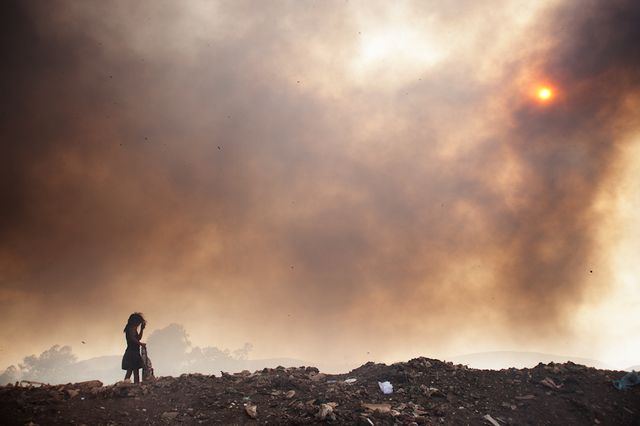
This past April, 33-year-old, Hampton, New Hampshire-based photographer won the in Whistler, British Columbia. ItŌĆÖs one of the worldŌĆÖs biggest adventure photography awards. Any action sports lensman could point to it as a pivotal moment in their career. For Nevins, winning the award was a shock. It was also an affirmation that he was shooting the right way. It was not the pivotal moment in his career. He says that moment came six years ago, when he first visited a Nicaraguan dump called .
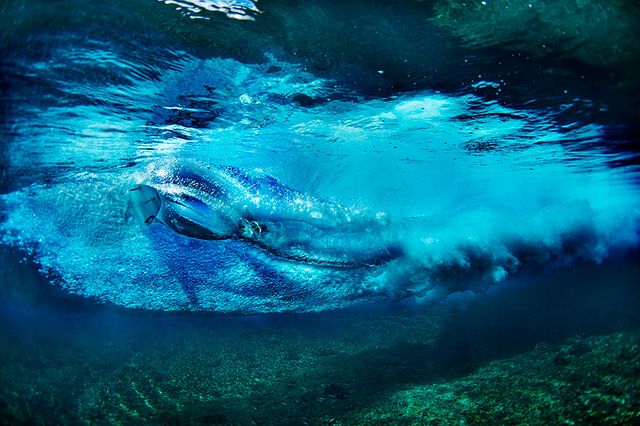
Everything started for Nevins with surf photography. After high school, he and a friend planned to travel to California to be surf bums. His father, who was an airline pilot, told him heŌĆÖd be cut off from free flights if he didnŌĆÖt attend school. Nevins enrolled at in San Luis Obispo as an easy way to take classes and surf. He stumbled into a photography class and latched onto a professor that inspired him, made him think, and, eventually, changed his life. ŌĆ£He said, ŌĆśIf youŌĆÖre going to go surf and be a beach bum, you might as well take pictures and see what you can do with it,ŌĆÖŌĆØ says Nevins. ŌĆ£And one thing led to another and it became my lifeŌĆÖs passion.ŌĆØ
He attended the and majored in photography, begged for a year until he got a job assisting as a surf photographer, and started shooting for while still taking classes. He graduated and spent eight years shooting action sports, living off mac and cheese and crackers while╠² traveling the world. ŌĆ£ItŌĆÖs not a lucrative job, but, you know, in my head, when I was younger, I thought, This is the most impossible dream.ŌĆØ he says. ŌĆ£So once I started making my $4 a year doing that, I didnŌĆÖt care.ŌĆØ
Then he went to the dump for the first time. He saw parents scraping the meat off of rotting cow carcasses while children walked barefoot over exposed hypodermic needles. It changed the way he viewed the world. ŌĆ£I shoot for different reasons now,ŌĆØ he says. ŌĆ£The La Chureca shoot, the day that crept into my life, I kind of stopped seeing surfing for the sponsored shots and the action shots and it just became looking at life and surfing differently,ŌĆØ he says. ŌĆ£I think the only shots I take of surfing now remind me of the things that I love, rather than the things I know will be published.ŌĆØ
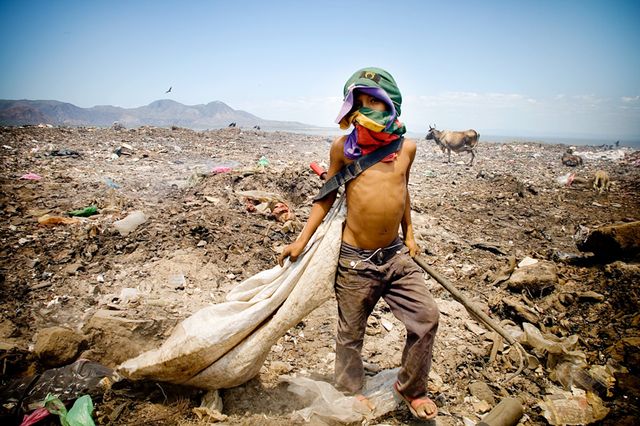
How did La Chureca come about?
I think itŌĆÖs been six years. A couple of surfers I worked with were like, Yeah, we did this last year and we wanted you to check this out. This guy, Brad Corrigan, who runs a charity called and is from , puts on an event. The first three years I did this, I had no idea what Dispatch was, so I had no idea he was a rock star. Anyway, the guys drag me in there. I had done non-profit work since day one. IŌĆÖve always tried to use the camera for something good, but came to nothing with it. It was always just the same sad pictures, no hope, whatever. But when I got down there, the experience was just so viciously different on a personal level and it kind of just stopped me dead in my tracks. IŌĆÖve been going down with Brad twice a year for six years now. ItŌĆÖs kind of hard to explain in a paragraph, but it ended up being the most overwhelming experience of my life.
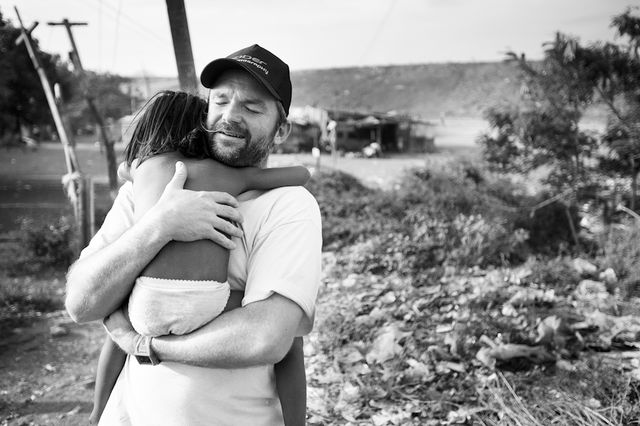
A couple of the guys I shot as pro surfers back there still help out too. ItŌĆÖs just such an easy thing to stop when you land in Managua. Now, if I go down for 10 days, I end up spending eight in La Chureca and two at the beach. It used to be vice versa. If I donŌĆÖt go to the beach first, itŌĆÖs really hard for me to go surfing. ItŌĆÖs become more of the destination for me than surfing at this point, but surfing was the thing that brought me there in the first place.
How did you approach it?
It wasnŌĆÖt really an assignment at all. Brad was still in the early stages of a big event and 50 people came down to the dump. If you ever went to this place back in the day … if you could draw hell, itŌĆÖs what it would look like. Brad had this vision: Why donŌĆÖt we make them a few days where life is pretty different? He sectioned off part of the dump, threw a free concert, and had the kids face painting. It brought good things to the dump. So it was just to participate, and I brought my camera down and found myself really buried in it.
What was it about the place that got you hooked?
It was the people. You always handle a non-profit, like, OK, sad situation. The reality of the world outside of our existence is just so different. The more you travel, the more you know how fortunate we are on a daily basis. So you go in there with this wall up, especially if youŌĆÖre taking photos: Yeah, that sucks. I wish I could do more. Blah, blah, blah. But after a couple of days of being in there, all of those families, they just kind of broke my wall down, especially the kids, and, in particular, this girl Wendy.
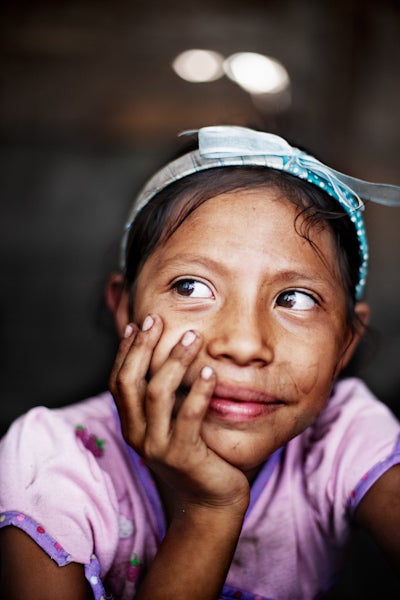
IŌĆÖve been working with her since the very beginning. SheŌĆÖs just incredible, and it was as simple as her just grabbing my hand. I used to just idolize and . I still do. What has teeth. It just rips your heart apart and forces you to see the world so differently. But they always say you have to just shoot it and not be a part of it, otherwise you change the story. I used to follow that attitude: Well OK, IŌĆÖm just going to shoot the world that way. With the kids there, they just wouldnŌĆÖt let that happen. I mean, you could shoot them, but theyŌĆÖre like: OK, cool, you got your photo. Do you want to play for a little while?
They break you down. YouŌĆÖre surrounded by burning carcasses and syringes and just the scum of the world piled up, and, all of sudden, it just disappears. It was Wendy especially. I was just looking into her eyes and she just wanted to play with me. And the camera gets put down, and the whole backdrop gets put down, and youŌĆÖre just living life legitimately for the first time.
ItŌĆÖs really humbling. IŌĆÖm really choking up just thinking about it. You feel so stupid all of the time, the way you think about your life and the things you do and how trivial it all is. And all it really is, is sitting down and taking in the world for just a minute. And a kid knows that, a child knows that. She just broke it down. I canŌĆÖt go in there to shoot them anymore. ItŌĆÖs really hard. I have to be a part of it. I more or less photograph my experience in there now. I want to change it. I want to be a part of it, and they want to change you. They have helped us more than weŌĆÖll ever help them. It doesnŌĆÖt take anything in this world to be happy. ItŌĆÖs just relationships and the small stuff thatŌĆÖs the important stuff. Sorry, thatŌĆÖs kind of a rant.

Not at all. Why do you think they let you in?
At times they will not let outsiders in. There are a lot of people that have gone into the dump over the years, and a lot of them are in your face. Like I was saying, how most people handle things: WeŌĆÖre going in there to fix it. WeŌĆÖre first world people and we have money. They can see right through it.
They simply see the sun is shining and think, IŌĆÖm alive today. You can get off your high pedestal and simply start seeing thatŌĆÖs all weŌĆÖre doing, just waking up and enjoying the sunshine. The second they see that youŌĆÖre that type of person, they just let you right in. And they have no shame. IŌĆÖm the one that should be ashamed, because IŌĆÖm the one with the dirty secrets. IŌĆÖm the one that gets angry when someone cuts me off in the lineup. IŌĆÖm the one with the issues. TheyŌĆÖre like, YouŌĆÖre the one with the problem. Why donŌĆÖt you come sit down and talk to us? ItŌĆÖs a very different vibe, and itŌĆÖs very humbling.
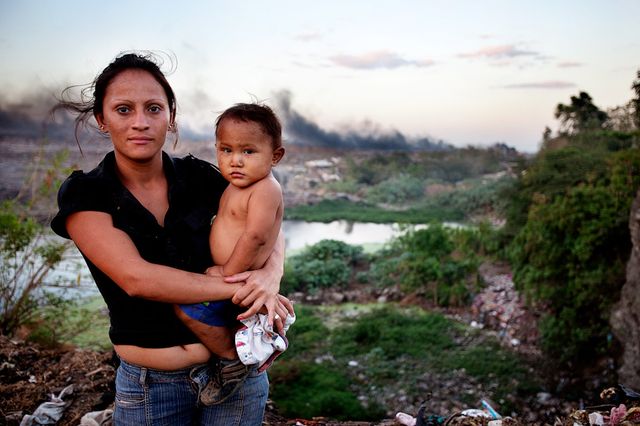
Can you take me through a normal day?
Normal is hard to say, because IŌĆÖve seen everything from a 14-year-old girl being thrown from a van onto the street after being raped and beaten to children starving themselves to be thrown into a hospital. Normal is really hard to say, but what you want the normal to be is that they wake up at seven oŌĆÖclock in the morning and everyone goes out into the dump to collect recyclables. They earn on average $8 to $10 a week. They collect copper and plastic. There are the people that collect it, the people that organize it, and the people that take it somewhere. They will also go through the trash to look for food.
As soon as a kid is six or seven they will go out there and work, backbreaking labor, all day, from six or seven in the morning until the sun goes down. ThereŌĆÖs another charity out there, called School of Hope, that built a school inside of the dump. Some of the kids can have a place with walls to hide out for a few years in the dump, as long as the parents let them go there.
Once they go to work, thatŌĆÖs what they do. And thatŌĆÖs in a perfect world, because the kids will get pushed onto pega, which is a glue-sniffing drug, or crack, or anything. You can have kids who are getting their hands on some really nasty drugs. ItŌĆÖs so easy to see how itŌĆÖs happening. Their life is incredibly difficult and theyŌĆÖre starving. And if youŌĆÖre starving for three or four days, you want to do something where you canŌĆÖt feel it. To see the value in going to school can be hard for them. But the ones that have seen the example of a school as a safe haven will continue to go.
WendyŌĆÖs the perfect example. Her mother and father are awesome. They have their fourth child. The father is a hard working dude. He lets the kids go to school. TheyŌĆÖre living some realities we canŌĆÖt understand, but theyŌĆÖre loving parents, which is another change. Most parents there donŌĆÖt say I love you to their kids. WendyŌĆÖs parents love their children.
WhatŌĆÖs the toughest shot youŌĆÖve taken?
Sometimes, for me, itŌĆÖs some of the shots of Wendy, and some of the kids, just happy and smiling. It really chokes me up, because when I go home, I just look at girls who get their license and the things they complain about, and I think, God, this girlŌĆÖs never going to know what itŌĆÖs like to drive a car, or go on a date with a boy. And so I see them smiling and I just picture that. Or I picture the possibility that they wonŌĆÖt have that in the future, and that kind of gets me the most.
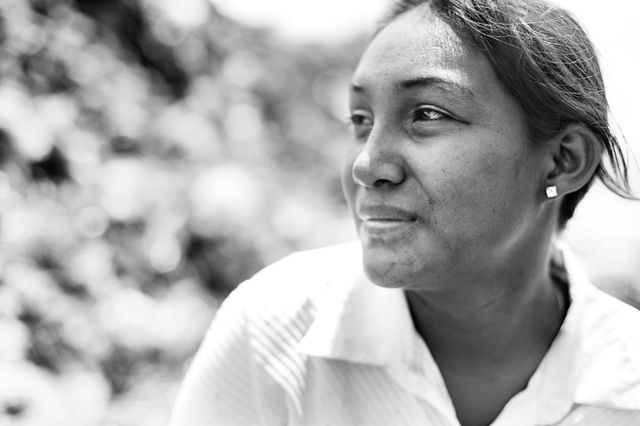
Illeana. Photo:
Looking back, thereŌĆÖs a couple pictures of Mercedes and Illeana, who were really close to Brad. They were kind of the fuel for him starting the project. They both died of AIDS. Mercedes was 14. Illeana was 17. So when I look back at those pictures, thatŌĆÖs hard.
Has your shooting evolved from when you first went down there?
I havenŌĆÖt posted anything in the past two years. IŌĆÖve kept it all back a bit, because I want to see what happens with this project with the Spanish government, and I want to see what happens with the landscape.
The place is very different now. Three, maybe two, years ago the Spanish government bought the property. Slightly illegally it was bought offŌĆö70 or 80 square milesŌĆöthe Nicaraguan government that didnŌĆÖt even own it. They have kind of leveled the place. The initial photos you saw, a lot of itŌĆÖs gone. A lot of the visual part, the part that itŌĆÖs easy for people to see that thereŌĆÖs a problem, thatŌĆÖs going away. TheyŌĆÖre building a transfer station, but theyŌĆÖre also displacing 1,200 people. ItŌĆÖs one of the biggest ecological disasters IŌĆÖve seen in my lifetime, so environmentally the change is a good thing. But socially and human condition-wise, things are still the same.
There are probably 2,400 people making a living there sorting through the trash. Whether itŌĆÖs in a house or something to rest under. The Spanish kind of set aside a portion of land, and are building a little ghetto. A lot of the families will have nicer homes then theyŌĆÖve ever hadŌĆötheyŌĆÖll have a one-bedroom concrete house. They kind of did this weird census thing where they went around to figure out who was honestly there the most. ItŌĆÖs kind of BS on the political side because theyŌĆÖre all in there to some degree. So some families got those homes while other ones will go to another settlement, which is about 20 miles away from the dump, but theyŌĆÖre so far out of the city that they canŌĆÖt get work, so itŌĆÖs kind of a fool's errand.
IŌĆÖm always shooting the kids IŌĆÖve shown since day one, and their growth. ItŌĆÖs like shooting your own kids, or your nephew or niece. You just legitimately care about them so much, and youŌĆÖre shooting how things have changed.
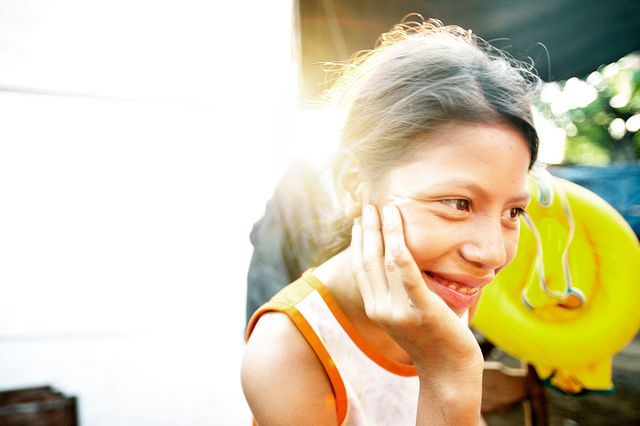
The last time I was down there, back in April, I actually brought a My First Camera for Wendy. Every time IŌĆÖve been down there sheŌĆÖs loved playing with the camera. Any kid in a third world country is going to grab the camera. For the most part youŌĆÖre hovering around them thinking, DonŌĆÖt break it. Wendy kind of really grasped photography. I feel really weird saying somebody is good at photography, because I think you could teach a monkey to do it, but she really got it. Over the course of a few years, IŌĆÖve gone down and given her the camera for a day and given her a project: Oh, shoot all the things you love in your life. SheŌĆÖd do a photo essay for me, and I put them up on a site so you can flip through that.
IŌĆÖm actually excited to see what sheŌĆÖs done with her My First Camera, pending, of course, that it hasnŌĆÖt been stolen or used for food or something like that. SheŌĆÖs been awesome to watch. You see something one way, but they see it different. YouŌĆÖre like, Oh my God, that breaks my heart. They see it as: Why is it breaking your heart? Let me show you why itŌĆÖs really cool. ItŌĆÖs interesting to see the stories they want to tell you.
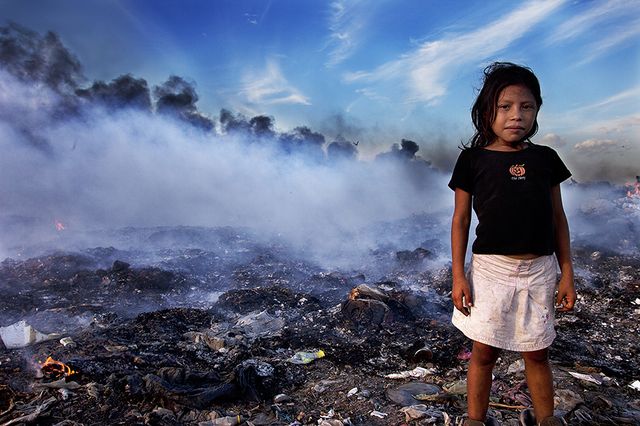
WhatŌĆÖs the most rewarding photo youŌĆÖve taken there?
I donŌĆÖt have one. They all mean a lot to me. Talking about it is nothing like being there, so I just look at them as reminding me of a time in my life. I do like the ones that have affected other people. ThereŌĆÖs definitely one of Wendy that has knocked a lot of people over. I wanted to take a portrait of her with the dump burning in the background, and I got so nervous over it, like it was my daughter. And so I gave her my sneakers to wear because I didnŌĆÖt want her to step on the burning trash. And she was like: Whatever, thatŌĆÖs stupid. I know how to do this.
She did it to humor me. So sheŌĆÖs wearing my sneakers with the trash burning in the background and sheŌĆÖs just smiling. SheŌĆÖs this drop dead beautiful girl and thereŌĆÖs just terror behind her. ThereŌĆÖs such a huge contrast. You can just understand the humanity when you see that. I didnŌĆÖt want there to be a starving kid in that scene. I didnŌĆÖt want you to see it that way. I didnŌĆÖt want all of the disasters in the world to be so unobtainable to all of us that you canŌĆÖt wrap your head around it, but when you see a beautiful little girl, that looks like somebody you know standing in it, you understand it more.
So that one has always affected a lot of people.╠²
I noticed a picture of guys stripping the meat off of what looks like rotting carcasses? ItŌĆÖs not on your main site, but it is on .
Yeah, that may have been the hardest photo IŌĆÖve taken. There was a family. We didnŌĆÖt know them, and I actually havenŌĆÖt seen them since. Those were piles upon piles of 400 rotting cow carcasses that were, like, four weeks old. They were disgusting. This isnŌĆÖt fresh meat, and they were scraping the tiny shards of meat off the skulls to try to make a bowl of soup for the night. To them it was like: WeŌĆÖre just getting by. This is normal. And weŌĆÖre like, Oh my god. It was hard to photograph. I didnŌĆÖt want them to know that I was showing somebody else. I wanted them to feel like it was a family portrait because I had talked to them for a while first. I didnŌĆÖt want it to feel like a shameful moment for them, because it was parents doing what they had to do for their kids to survive.
We offered to take them out for dinner, and theyŌĆÖre like, Yeah, OK. It was $3 and they ate enough carnitas to puke, but they still kept the meat from the carcasses. They brought it with them, like: Oh no, no. WeŌĆÖre going to eat this. We donŌĆÖt know whatŌĆÖs next.
The next day, we had this younger pro surfer girl and we were going in to do some sunrise shots. I was like: Oh my god, just close your eyes. DonŌĆÖt look at this. We were passing a death truck. ItŌĆÖs a big garbage truck that takes the innards from animals. If you look at it, you ŌĆśll puke. As they were dumping it over, people weŌĆÖre reaching over and grabbing things to put in their pocketsŌĆöanything that could possibly be viable food. Your heart just breaks. I will always feel so guilty. I eat the food that I choose to eat and drink clean water. ItŌĆÖs so hard to see how weŌĆÖve created this balance in the world. ItŌĆÖs vicious. ItŌĆÖs literally just you and me instilling this change. We donŌĆÖt have to wait for the government to do it. And thereŌĆÖs just this overwhelming feeling when you see that. Give me the strength not to be angry today and put my energies into doing something better.
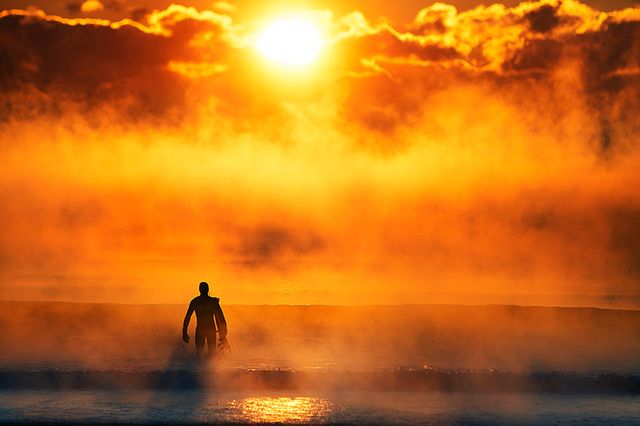
Has this project changed your photography?
Absolutely. ThereŌĆÖs no ifs, ands, or buts about it. ItŌĆÖs still a driving project for me. I havenŌĆÖt lost any speed or desire. IŌĆÖm still in as much love with it as the first day I saw it. And not to discredit it, but just shooting the basic surf stuff and the cool part of life was a big deal, and itŌĆÖs just not a big deal anymore. I still value surfing and I want people to value surfing and snowboarding because itŌĆÖs so important to do these activities and be outside. These are the good things in life. I even share surfing with the people at the dump, but I shoot differently now.
I shoot people and adventures for the experience and the love of it. You know, the lineup and the way it feels to be a surfer instead of the hot moves now. That part of it doesnŌĆÖt make sense to me anymore. The fashion doesnŌĆÖt make sense to me anymore. I can see people and shoot people how they are now. It makes you see the world differently for sure. It makes you block out the things you donŌĆÖt need to share and donŌĆÖt need to shoot. The stories you donŌĆÖt need to tell go away too.
My life is my life before going to the dump and my life after going to the dump. And itŌĆÖs not just photography. Jesus, I was a traveling bachelor, and that place really opened my eyes up to having Samantha, my fianc├®, in my life and trying to create a life and see this part of the world and trying to be grounded a bit more. Not being so young and dumb, I guess. It was a huge, huge change in my life.
And then in 2012, you won Telus?
Yeah, that was pretty gnarly. I didnŌĆÖt see that one coming at all. I was mortified getting in the finals and I was mortified winning, especially considering who I was sitting next to. That was all surf photos, but no logo sponsored shots. It was literally more or less what I just said, you know, Well IŌĆÖm just going to put in all of the photos that I love that tell the story of my surfing life. Next thing I know IŌĆÖm standing up making a speech completely mortified, red in the face, tripping over my words.
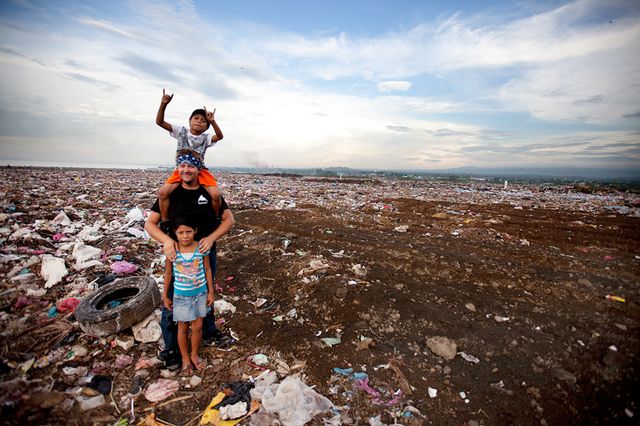
Nevins at La Chureca. Photo:
Do you see yourself moving more into reportage?
I'm not going to say IŌĆÖm at a standstill right now. IŌĆÖm still working it all out. I do so much with the music industry right now, and itŌĆÖs kind of a love/hate thing. IŌĆÖm trying to figure it all out. I thought back in the day that adventure sort of thing was going to be it. After going to Nicaragua six years ago, thatŌĆÖs kind of broken in half. IŌĆÖm kind of in this weird hodge podge of not quite understanding, and letting things take their own course. Ask me in three more years. Right now is a day-by-day thing. The only thing I have that is stable is going down there, because that gives everything a balance. The rest of my photography is still up in the air.
What is the one thing you hope people get out of La Chureca?
I want two things out of all of it. ItŌĆÖs one to understand how easy it is for any of us to make a change. I mean, IŌĆÖm nobody. IŌĆÖm just a kid from New Hampshire. ThatŌĆÖs it. And going down and spending time with somebody changes their world. And itŌĆÖs applicable back home, and itŌĆÖs applicable anywhere you go. Most of the places we travel to, this exists. This is a common thread. La Chureca exists globally, and it gets much worse. Go to Haiti. Go to Indonesia. These are humongous La Churecas, but if you can stop and just have a human connection, and understand the different conditions, it changes your life. If they can change the way IŌĆÖm looking at it, they can do it for everybody.
Stop looking at the world as, I need to obtain, I need to get this, I need to have this. Start looking at it as, I need to give back, and be a part of it, and go with the flow. Just take the time. ItŌĆÖs not worth it so you can tell somebody you did a charity thing. ItŌĆÖs not worth it because it looks good. ItŌĆÖs worth it because it changes who you are in the best possible way. I just hope someone else wants to go down or share stories from somewhere that I donŌĆÖt know about, and that it makes me look at La Chureca differently, or at my life differently.
ThereŌĆÖs a bunch of hopes, I guess. Hopefully none of them are down there living in those conditions. ThatŌĆÖs what I really hope. I just hope that those kids have the opportunity to have everything we have at some point. ThatŌĆÖs it.
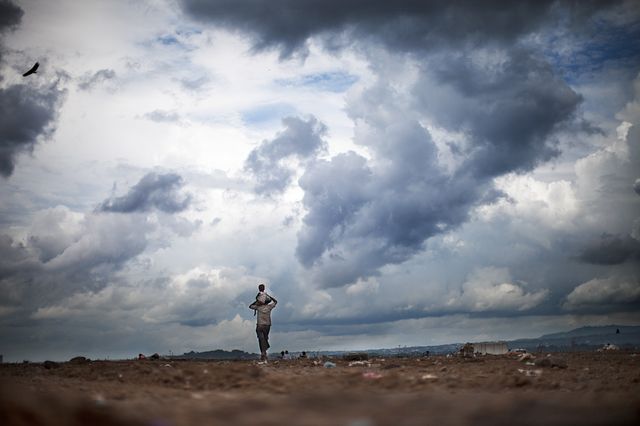
La Chureca. Photo:
For more photos, check out the La Chureca gallery.
To learn more about La Chureca, go to .
ŌĆöJoe Spring